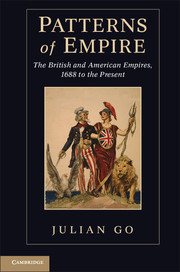Book contents
- Frontmatter
- Contents
- Preface and Acknowledgments
- List of Tables
- List of Figures
- Introduction
- 1 Imperial Paths to Power, 1688–1939
- 2 Colonial Rules
- 3 Hegemonies and Empires
- 4 Imperial Forms, Global Fields
- 5 Weary Titans
- 6 The Dynamics of Imperialism
- 7 Conclusion
- Appendix Notes on Data
- Archives and Abbreviations
- References
- Index
7 - Conclusion
Published online by Cambridge University Press: 05 June 2012
- Frontmatter
- Contents
- Preface and Acknowledgments
- List of Tables
- List of Figures
- Introduction
- 1 Imperial Paths to Power, 1688–1939
- 2 Colonial Rules
- 3 Hegemonies and Empires
- 4 Imperial Forms, Global Fields
- 5 Weary Titans
- 6 The Dynamics of Imperialism
- 7 Conclusion
- Appendix Notes on Data
- Archives and Abbreviations
- References
- Index
Summary
To an outsider, the fact that America is an empire is the most obvious fact of all.
– Henry Fairlie (1965)The so-called American Empire is in fact a feeble imitation of the Roman, British, and French empires.
– Arthur Schlesinger, Jr. (2005)It has become more common to think of the United States as an empire. Although some “empire deniers” persist, they face an increasingly loud chorus of post-revisionist scholars, pundits, and even officials who are willing to entertain the idea that the United States is and always has been imperial. This book joins that chorus, but it has also sought to push further, dig a little deeper, and look more widely. Rather than seeking a warrant to call the United States an empire, this book has put America's imperial formation in comparative light. It has examined differences and similarities between America's imperial practices, forms, and dynamics on the one hand and Britain's imperialism on the other. The United States is and has been an empire; this book has examined its differences and similarities with its predecessor.
- Type
- Chapter
- Information
- Patterns of EmpireThe British and American Empires, 1688 to the Present, pp. 235 - 246Publisher: Cambridge University PressPrint publication year: 2011



